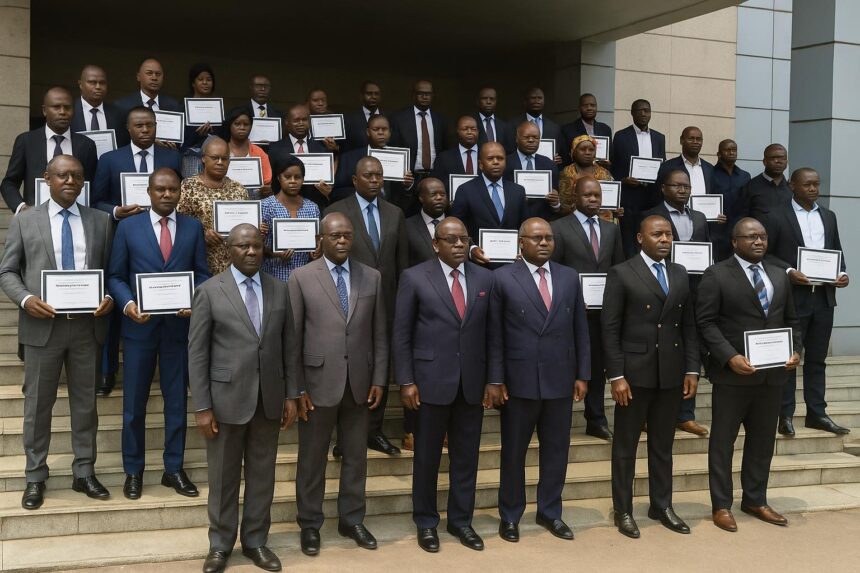A Milestone in Public Service Training
Thirty civil servants from various Congolese ministries stepped forward in Brazzaville after receiving certificates in results-based monitoring and evaluation on 3 September. The brief ceremony crowned a hybrid training programme designed to sharpen planning discipline across the public sector.
Minister Delegate for State Reform Luc Joseph Okio handed over the parchments. He stressed that capacity building sits at the heart of policy, adding that modern administration requires verifiable data and clear metrics to justify every franc of public spending.
Inside the Brazzaville Workshop
The sessions held 12–16 May mixed virtual lectures with practical work on dashboards, logical frameworks and indicator mapping. Participants from health, education, infrastructure and finance practised translating broad goals into measurable outputs, outcomes and impacts.
Course director Roger Ongouaomo-Moké described the certificate as both honour and burden. “Each graduate now carries an increased duty to question, verify and adjust programmes,” he said, urging them to act as ambassadors for modern management inside their respective departments.
Government Vision for 2025-2029 Reforms
Minister Okio also lifted the veil on the forthcoming 2025-2029 Strategic Reform Plan. Drafted after a national diagnostic of monitoring capacity, the blueprint seeks to anchor a culture of results where budget lines, timelines and performance indicators remain intertwined from conception to completion.
“We want evidence, not assumptions,” the minister insisted, citing international best practice that links funding to verified milestones. According to him, stronger evaluation should unlock greater confidence among development partners and help the Republic of Congo accelerate its national development strategy.
Cultivating a Culture of Accountability
The ceremony’s keynote focused on accountability, a term repeated throughout the morning. Officials argued that timely feedback loops allow planners to tweak activities before costs escalate. In their view, transparent scorecards do not merely track performance; they actively inspire better service delivery.
Observers note that the focus on measurable outputs mirrors regional governance reforms. Though the ceremony was modest, analysts called it a clear signal that Brazzaville is adopting evidence-based management to match citizens’ growing expectations.
Voices of the Trainees
Graduates voiced cautious optimism. A Health Ministry planner said the tools would help refine vaccination campaigns by linking budgets to coverage targets. A finance analyst predicted the skills would shorten reporting cycles and cut redundancies.
Yet the cohort also acknowledged challenges ahead, notably outdated data systems and uneven internet access in remote departments. They argued that certification must be matched with sustained investments in hardware, software and provincial coaching if monitoring dashboards are to remain current and credible.
Strategic Importance for Development
Policy commentators link the push for robust evaluation to the broader effort to diversify the hydrocarbon-dependent economy. By identifying which social initiatives deliver the highest returns, authorities hope to direct oil revenues toward education, health and infrastructure programmes with demonstrable, long-lasting benefits.
Economic planners argue that transparent metrics also strengthen negotiations with lenders by showcasing internal accountability mechanisms. While international partners routinely request quarterly reviews, officials say the new skills will allow local teams to anticipate questions and supply disaggregated figures without costly external consultants.
Ministers and Mentors
Throughout the event, mentoring emerged as a recurring theme. Senior advisers pledged to pair each graduate with an experienced evaluator for at least six months, providing on-the-job troubleshooting and peer review. The approach, they said, would bridge theory and daily administrative realities.
The ministry further intends to publish anonymised success stories in an annual digest, allowing other departments to replicate proven methods. Observers view the publication plan as a subtle but effective incentive, rewarding teams whose scorecards show tangible progress against baseline figures.
Looking Ahead to Measurable Results
As the audience dispersed, the ministerial message remained clear: certification is a starting line, not a finish tape. True success will be judged over the coming budget cycles, when dashboards reveal whether training has indeed tightened timelines, cut wastage and amplified social impact.
For now, the graduates return to their offices carrying laptops, manuals and a renewed sense of purpose. If their ambitions translate into cleaner data and clearer decisions, Congo-Brazzaville’s public institutions may edge closer to the efficiency citizens have long requested.
Until then, observers will watch the 30 newly minted evaluators, measuring their progress just as carefully as they intend to measure public programmes. Their journey illustrates how the quest for accountability begins not with grand announcements but with modest, well-structured training rooms.
Digital Tools Drive Accuracy
Digital dashboards were central to the May sessions. Trainers showed simple Excel macros that flag spending deviations in minutes. Graduates were surprised how low-cost software could replace paper logbooks, freeing staff for substantive analysis instead of manual aggregation.
However, instructors cautioned that technology remains only as strong as the data fed into it. They urged ministries to standardise collection templates down to the district level, arguing that consistent input protocols would prevent conflicting figures and support nationwide comparisons of programme effectiveness.






















